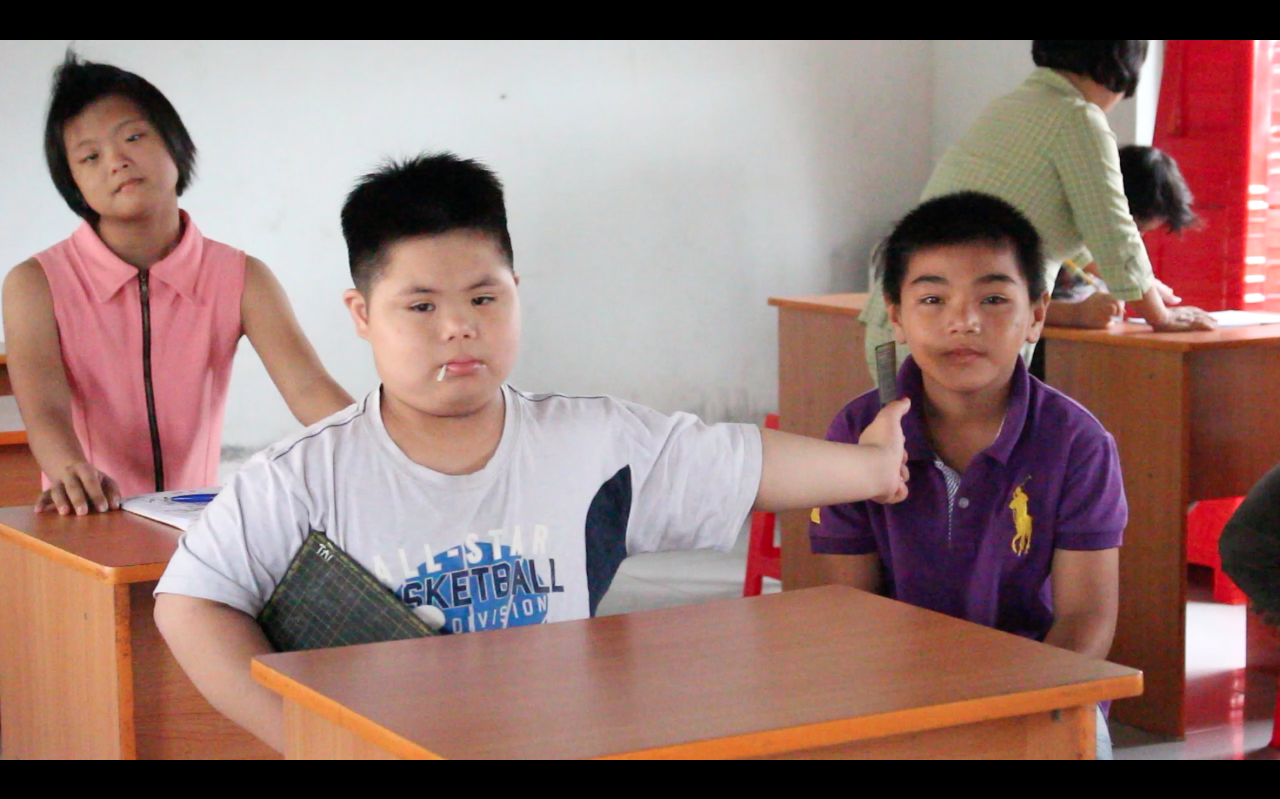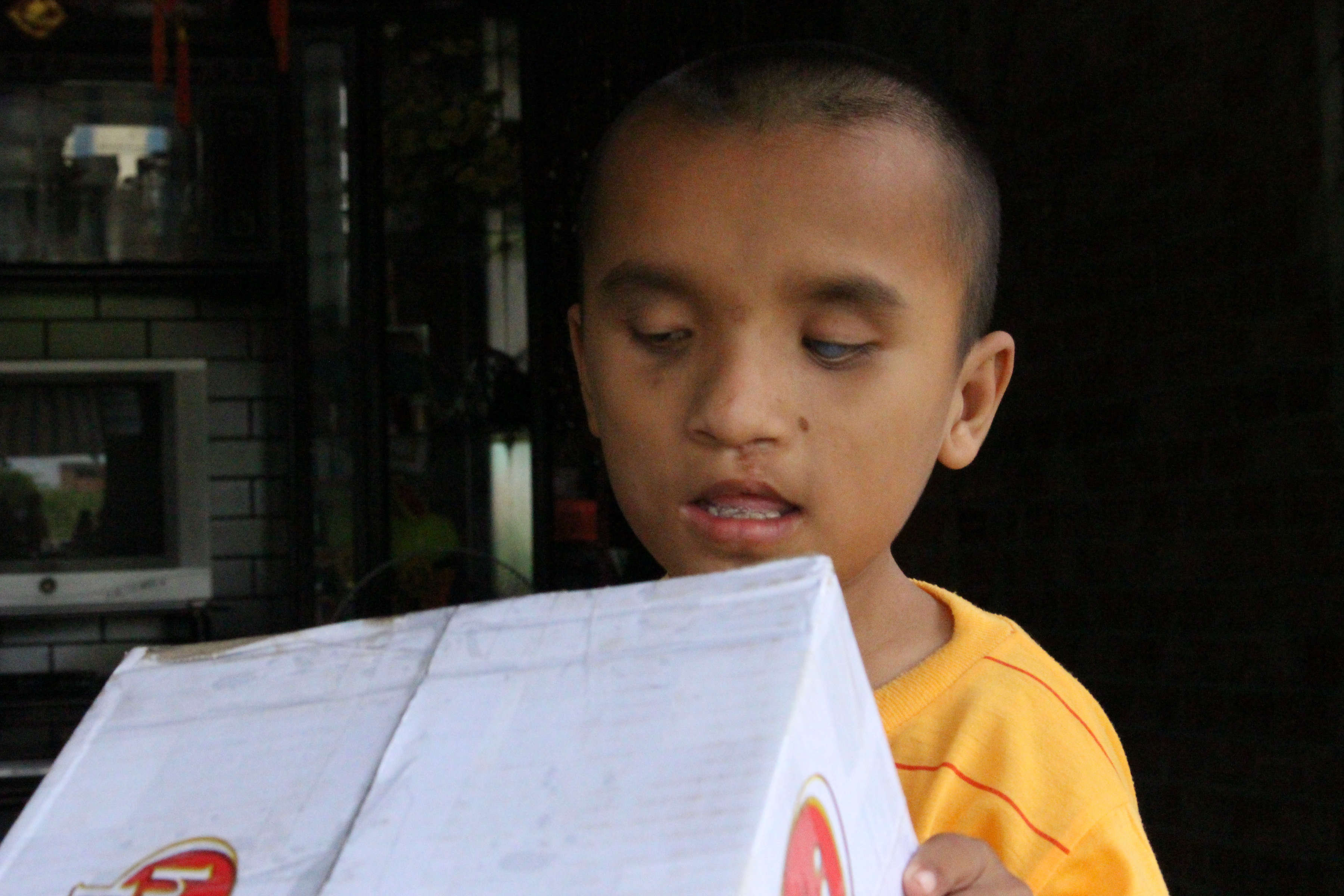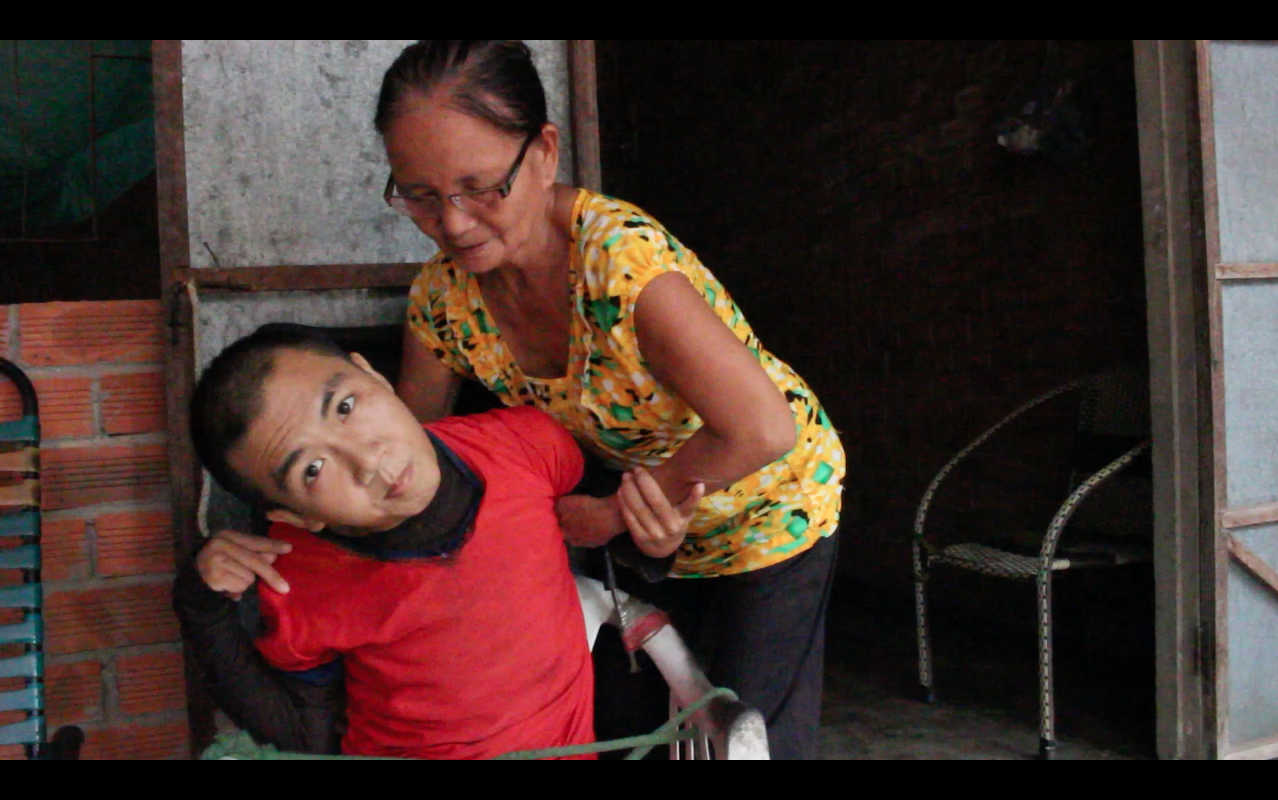Is better good enough?
For the blind, visually impaired, or those who prefer to listen rather than read – listen to this chapter on Soundcloud.
The clock strikes noon in Hanoi – it’s lunchtime in the VNAH office. Bui Van Toan, Truong Le Thu Huong and half a dozen other workers shut down their computers and clamber into the elevator. The cost of a good bowl of soup on the street is 30,000 Vietnamese Dong – less than two Canadian dollars – so there’s no need for lunch boxes.
Bui and Truong shuffle around the line leading out of the weathered archway of the Temple of Literature and stop in front of what looks like an aging home. In front of the building, a man stands behind a large silver mobile barbecue. Rows of thin pieces of pork are being charred on the burning grill. Inside, 20 locals sit at low wooden tables enjoying bowls of noodles. Brightly coloured plastic stools that look like they belong in a child’s playroom fill the room. Bui sits. His knees hit the top of the table forcing him to crouch over the small dining surface.
Three bowls of soup are dropped onto Bui and Truong’s table along with a plate of leafy greens and a platter of crispy spring rolls. Truong grabs a handful of lettuce and mint from the plate in front of her and drops them into her soup. She lifts the bowl in one hand and holds a set of chopsticks in the other, quickly emptying the noodles into her mouth.
They are eating bun cha, the lesser-known cousin of Vietnam’s famous soup – pho. The soup is a specialty of the North and is eaten for breakfast, lunch and dinner. The savoury dish is flavoured with fish sauce and a pork based broth. As the noodles begin to disappear, Truong recounts the day’s events to her boss. Bui knowingly shakes his head – he’s not surprised by what he’s heard. An angry communist official isn’t particularly shocking he says with a shrug, although he’s sorry that his guest and his intern had to experience it.
With the bowls of soup completely drained it’s time for coffee. The Vietnamese are known for their strong caffeinated beverages that are almost always sweetened with thick condensed milk and plenty of sugar. Bui pours some milk into his small coffee cup and slowly stirs it in silence.
“Disabilities in Vietnam are like a wall,” says Bui, taking a long sip from the white porcelain mug. You can’t just bulldoze through the barrier, he explains, otherwise the entire system will crumble. But if you want the wall to come down, you have to do it slowly and methodically – eliminating the issues brick by brick, until the barrier completely disappears.
“Disabilities in Vietnam are like a wall.”
He places the coffee back on the table and looks out the window admiring the vast pagoda in front of him. Above the tall brick walls the red roof of the Temple of Literature is visible. Tourists stand on the Temple’s balconies and smile for the camera of their smartphones. The soundtrack of the street drowns out the soft melody of the Vietnamese song playing on the coffee shop’s radio.
When asked whether or not the Law for Persons with Disabilities has been successful, Bui says firmly that it’s made things better. It’s an answer that’s been echoed by nearly every person I spoke to who’s working in the field. But the question remains: is better good enough, or even good at all?

Students sit at the desks in the Centre for Feeding, Training and Educating the Victims of Agent Orange/ Dioxin in Tay Ninh.
While we enjoy our coffee in Hanoi, Nguyen Hong Quan sits in Tay Ninh in front of his concrete shelter tied with a rope to a plastic chair. In Quang Binh, people continue to lose their limbs disassembling bombs left from a long-ago war because it’s the only source of income available. People in the South, who fought on the losing side of the war and were disabled as a result, receive no aid because of where their allegiances lay. In big cities like Saigon and Hanoi, accessibility is still an issue, but the disabled population has opportunities to go to school. They are given the chance to learn and grow in a society that’s far more accepting than in rural areas. But is this due to the government, advocacy groups, or the general progression of a metropolitan centre in the modern age? It’s likely that the combination of the three have helped boost the development in these cities, but it’s impossible to pinpoint which has had the greatest impact and why.

Ngo Van Vo’s son plays with his treasured box outside his home in Tay Ninh.
According to the World Bank, Vietnam has had one of the fastest growing economies in the world since the 1990’s. As the economy continues to strengthen, Vietnam has lifted itself from one of the poorest nations to a lower middle-income country. And with more money arguably there is more social progress. When examining the status of people with disabilities before the law and comparing it to today, the changes in the quality of life are clearly measurable. Yet, with the increase in cash, the improvement in development issues – specifically surrounding people with disabilities – appear modest compared to the goals outlined in the UN Convention, and in turn Vietnam’s law.
Vietnam has been working to become an economic and political player in the international game. Adopting the UN Convention was a positive step in that direction. But there is little reference to Vietnam’s own culture in its law, which closely mimics the language written by the UN. In fact, the only time that the country or its culture is directly referenced in the English version of the law is in the 12th article. And even then, it’s to emphasize that any international aid given to the disabled community must align with the ideals of the government and “shall be carried out on the basis of respect for Vietnam’s independence.” Even with more money in Vietnam’s pockets, there are still a number of cultural variants that may not have been considered before the country implemented the language of the convention into its own piece of legislation.
Firstly, the deep seeded stigma embedded in Vietnam’s culture is still an issue that impedes progress in the country. It’s still widely believed that people with disabilities are satanic monsters and that they are not fully functioning human beings. It’s virtually impossible to effect change in a place where the disabled continue to be shunned by their society. The Law for Persons with Disabilities addresses issues surrounding discrimination, but the government has done little, if anything, to attempt to eradicate the stigmatization. Through my research, I couldn’t find any signs of education campaigns run by the government to change the attitudes of the public. There have been no amendments to the law, or new policies directly targeting the issue of discrimination towards people with disabilities. So if the public is prejudice towards the disabled community, and the government isn’t working to improve that, then how do they hope to change?
Though Vietnam’s economy has drastically improved in the last few decades, the greatest impact has been seen in the country’s business centres like Saigon and Hanoi. There’s a drastic economic disparity between these cities and the rural provinces that make up the majority of the country’s population. In turn, there’s a lack of resources in these impoverished areas. Despite this gap, these isolated provinces are given the same laws to implement with vastly different budgets. Many areas have no resources whatsoever. Meaning, that on a provincial level, the disabled community receives no support and has limited access to basic necessities like proper health care or an education.
And the final, and potentially biggest, issue that prevents development in Vietnam is the one-party Communist system. Ho Chi Minh is revered like a god throughout the country. His face is plastered on bright red billboards and posters that hover above the busy streets. His portrait is framed and nailed on to the walls of homes in every province. Intimate shrines have been constructed with Uncle Ho’s statue surrounded by candles and gifts of food and money. But the government this father-like figured instated, isn’t interested in listening to the voices of its people. When opinions are publicly expressed that negatively reflect the government, it’s seen as an attack on the country’s “independence.” Advocacy groups do their best to help the disabled community in their area in any way they can. But, under the watchful eye of the government, they can’t speak out or inform the public about the injustices of the inherently flawed system.

Thuong Thi Tran helps her disabled son, Nguyen Hong Quan, outside of their home in Tay Ninh.
Organizations from across the world, such as the Ford Foundation, Irish Aid, and USAID, provide support to the non-profits working in the field, but charity can only go so far. Without the government channeling their efforts into building sustainable systems such as accessible schools and work training programs, specialized hospitals, and training medical professionals, it’s nearly impossible for the quality of life of the disabled to improve. It’s far easier for an international group to work in a metropolitan area where people are more receptive to change and there are more resources available. If a disabled person lives in a rural or isolated province, they’re essentially condemned to a life locked inside four walls, relying on their families to keep them alive and looking at the world through fogged windowpanes.
Advocating for the rights of people with disabilities is still a relatively new concept and change of any kind takes time. Even in developed countries like Canada, not every place is fully accessible. Vietnam’s government is its own biggest enemy in the fight for progress. But at the same time, it’s because of the Communist regime that the country has been able to change in the first place. Through signing and ratifying the UN Convention, reaching out to the other international bodies for support, and by implementing a law of its own, it’s clear that the government wants to improve the conditions for people with disabilities. Despite the limitations the government has created, it’s still open to grow and develop. Any step forward, no matter how modest, is still forward.
Bui drains the remaining coffee from the bottom of his mug before exiting the café, firmly planting his feet back onto the busy sidewalk. Lunch is over and he’s a busy man.
He crosses in front of the Temple of Literature and its seemingly never-ending line of tourists awaiting entry. He makes his way back towards the glass doors of his office just an elevator ride away. For Bui and his team at VNAH, there is more work to be done, and another brick to remove from the ever-towering wall.